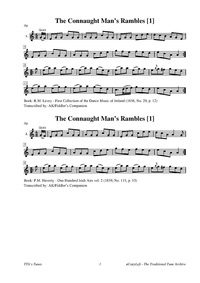Template:Pagina principale/Vetrina: Difference between revisions
No edit summary |
No edit summary |
||
| Line 1: | Line 1: | ||
{{SheetMusic | {{SheetMusic | ||
|f_track= | |f_track=The Connaughtmans Rambles.mp3 | ||
|f_pdf= | |f_pdf=Connaughmans Rambles.pdf | ||
|f_artwork= | |f_artwork=Connaught.png | ||
|f_tune_name= | |f_tune_name=Connaughtman's Rambles | ||
|f_track_title= | |f_track_title=Connaughtman's_Rambles_(1)_(The) | ||
|f_section=abc | |f_section=abc | ||
|f_played_by=[https://soundcloud.com/ | |f_played_by=[https://soundcloud.com/trad-tune-collection Fionnlagh Ballantine] | ||
|f_notes= | |f_notes= Kylemore Abbey, County Galway, Connaught (Connacht), Ireland. | ||
|f_caption= | |f_caption=Connaught was one of the five old provinces of Ireland (along with Ulster, Leinster, Meath, and Munster), named for the ancient tribe who lived there, the Connachta. | ||
|f_source=[https://soundcloud.com/ | |f_source=[https://soundcloud.com/trad-tune-collection/jig-the-connaughtmans-rambles Soundcloud] | ||
|f_pix=420 | |f_pix=420 | ||
|f_picpix=200 | |f_picpix=200 | ||
|f_article=[[ | |f_article=[[Connaughtman's_Rambles_(1)_(The) | '''Connaughtman's Rambles''']] | ||
The | The jig is one of the most enduring and popular pieces in the Irish repertoire, and has even spread to other genres. It is, for example, one of the commonly played jigs for English rapper sword dancing (along with "[[Blackthorn Stick (The)]]" and "[[Ten-Penny Bit (The)]]"), and is a staple for contra dancing. Connaught was one of the five old provinces of Ireland (along with Ulster, Leinster, Meath, and Munster), named for the ancient tribe who lived there, the Connachta. The title appears in a list of tunes in his repertoire brought by Philip Goodman, the last professional and traditional piper in Farney, Louth, to the Feis Ceoil in Belfast in 1898 (Breathnach, 1997). County Leitrim piper and fiddler [[biography:Stephen Grier]] entered the jig as "Connaught Man's Rambles" in Book 3 of his large c. 1883 music manuscript collection. | ||
}} | }} | ||
Revision as of 07:46, 11 June 2023

Played by: Fionnlagh Ballantine
Source: Soundcloud
Image: Kylemore Abbey, County Galway, Connaught (Connacht), Ireland.

The jig is one of the most enduring and popular pieces in the Irish repertoire, and has even spread to other genres. It is, for example, one of the commonly played jigs for English rapper sword dancing (along with "Blackthorn Stick (The)" and "Ten-Penny Bit (The)"), and is a staple for contra dancing. Connaught was one of the five old provinces of Ireland (along with Ulster, Leinster, Meath, and Munster), named for the ancient tribe who lived there, the Connachta. The title appears in a list of tunes in his repertoire brought by Philip Goodman, the last professional and traditional piper in Farney, Louth, to the Feis Ceoil in Belfast in 1898 (Breathnach, 1997). County Leitrim piper and fiddler biography:Stephen Grier entered the jig as "Connaught Man's Rambles" in Book 3 of his large c. 1883 music manuscript collection.
...more at: Connaughtman's Rambles - full Score(s) and Annotations
X:1 T:Connaught Man's Rambles [1], The M:6/8 L:1/8 R:Jig B:R.M. Levey - First Collection of the Dance Music of Ireland (1858, No. 29, p. 12) Z:AK/Fiddler's Companion K:Amin V:1 clef=treble name="1." [V:1] "Quick"(G/F/)|EGG cGG|AGG cGG|EGG cde|dcB AGE| EGG cGG|AGG cde|gfe fed|ecA A2:| |:g|(ea)a (eg)g|(ea)a (ge)d|(ea)a (eg)g|e{a}g^f ged| (ea)a (eg)g|(ea)a (ge)d|c>(d/e/f/) ged|ecA A2:|]
